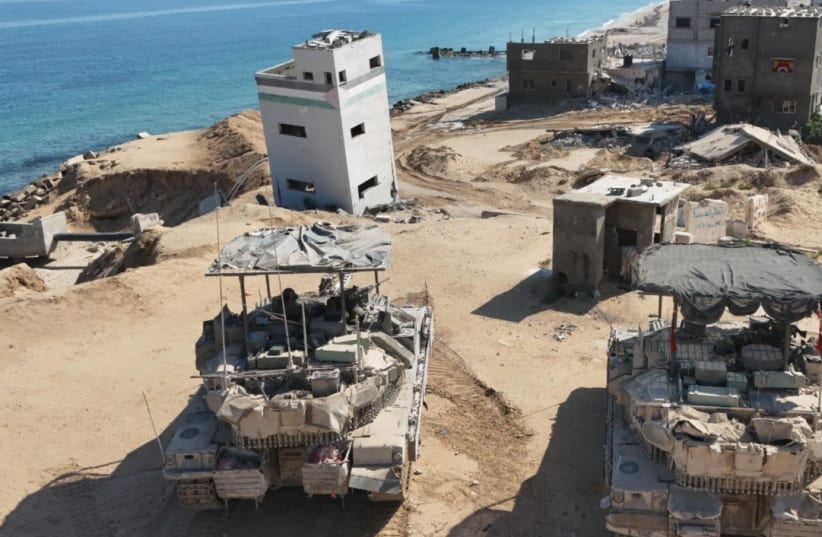 In Rafah, ‘there is almost no home without a tunnel,’ says Nahal Brigade Commander
In Rafah, ‘there is almost no home without a tunnel,’ says Nahal Brigade Commander
TOVAH LAZAROFF
The IDF brought a small number of reporters to Gaza to speak with Nahal Brigade Commander Colonel Yair Zuckerman about the extent to which Hamas has integrated itself into civilian areas.
.

(photo credit: IDF SPOKESPERSON’S UNIT)
A white cat walking across a partially destroyed building in Rafah’s Shabura refugee camp was the only civilian remnant of the Gaza neighborhood by the Egyptian border, which until the start of May had been crowded with Palestinians.
A bullet-riddled Sonol sign still hung on top of the rubble of what had once been a gas station.
Half destroyed concrete buildings stood, in some cases reduced to framed shells, intermixed with piles of rubble
Large swaths of sand, covered what had once been paved roads, giving Shabura a dustbowl appearance.
The IDF brought a small number of reporters in a Humvee into this desert landscape on Tuesday, to speak with Nahal Brigade Commander Colonel Yair Zuckerman about the extent to which Hamas has integrated itself into the civilian area.

Just one week earlier, four IDF soldiers were killed when a bobby-trapped building exploded in this neighborhood. Now, however, an empty silence hung heavy under the bright afternoon sun, broken only by the soldiers on the road and the nearby tanks and tractors.
Zuckerman met with reporters on what he said was the 41st day of the battle for Rafah, in one of the more intact buildings in the neighborhood, whose occupants had fled.
Wearing a khaki uniform and flak jacket, he sat with them in what had once been a large second-floor apartment.
The windows were covered by blankets. The only civilian remnant in the room was a small sofa, with wooden trim and light brown fabric.
Soldiers had written on the white walls directional signals in Hebrew: North, south, east, and west.
The electricity was run by a generator, which hummed during the entire conversation and was broken several times with distant sounds of explosions.
The table in front of Zuckerman was filled with computers. Using the wall as a screen he mapped out how, soldiers had been able to enter Rafah, staying one step ahead of Hamas strategically.
Never-ending tunnels in Rafah, posing challenges to the IDF
“Rafah is chalk-filled with tunnels,” he said, adding that, “During the last days alone, I found 17 tunnels.”
“There is almost no home without a tunnel,” he said, as he explained that the tunnels connected the homes in the neighborhood in one vast labyrinth. Holes were also broken through the walls to connect them, he said.
To illustrate his point, he showed a photograph with an open closet door and behind it, a hole in the concrete wall.
Homes are boobytrapped with wired explosives that can be detonated at a distance, Zuckerman said, as he referenced the incident last week in which four soldiers were killed when the bomb was set off in a home believed to be free of such devices.
This is a different kind of battlefield, as he described the methodical inch-by-inch fighting that has taken place in Rafah, where soldiers are battling above and below ground.
“It’s slow and painstaking,” he said, but the achievements “are significant.”
Soldiers have found caches of weapons, rocket-propelled grenades, and long-range rockets, Zuckerman explained, as he argued that it was important that the IDF be given time to complete its mission of demilitarizing the area.
The soldiers here “understand that this existential problem rests on their soldiers,” Zuckerman said, as he described a situation in which a myriad of small almost indiscernible successes, would ultimately lead to complete victory.
He did not want to quantify how long it would take to complete the mission, just that it was important to finish the job.
“We don’t want to leave until we have solved the problem,” he said.
Zawartość publikowanych artykułów i materiałów nie reprezentuje poglądów ani opinii Reunion’68,
ani też webmastera Blogu Reunion’68, chyba ze jest to wyraźnie zaznaczone.
Twoje uwagi, linki, własne artykuły lub wiadomości prześlij na adres:
webmaster@reunion68.com
